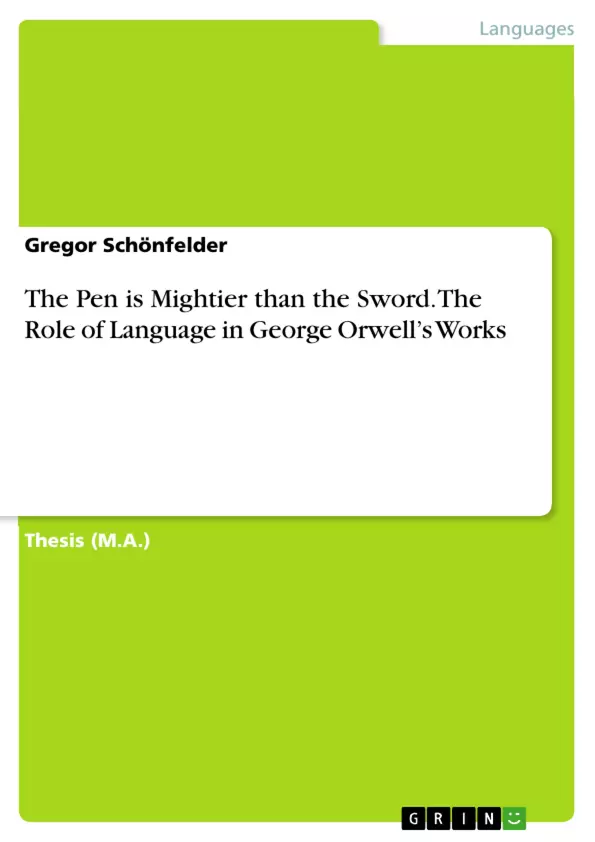The role of language and in particular how it can be manipulated pervaded George Orwell's works from the very beginning. Most readers are familiar with "1984", but the crucial role of language in shaping our lives came up as soon as "Burmese Days."
This work analyses many of Orwell's works, prose as well as essays, and shows the paramount importance language and its manipulation played in Orwell's works.
George Orwell was unarguably one of the, if not the, most influential political writers in English of the twentieth century, “the cultural icon and mythic figure who is probably more quoted and referenced than any other modern writer” (Rodden, Preface x). Today as well as when he was alive, Orwell was more than a novelist and essayist, but he produced writing in every possible form: reportages, poetry, film and book reviews, opinion columns. Yet, Orwell today has become more than a writer: during the seven decades since his death, he has become a cultural icon, a “mythic literary and public personality” (Rodden, Preface xi) who is not only canonised in school books but who has also become some sort of intellectual hero. The main reason for this is most probably Orwell’s literary integrity or, what is sometimes called, “a sense of decency,” (Atkins 1) which he displayed throughout his whole life. [...]
Inhaltsverzeichnis (Table of Contents)
- Introduction
- Early Novels
- Burmese Days
- A Clergyman's Daughter
- Keep the Aspidistra Flying
- A Turning Point: Homage to Catalonia and Looking Back on the Spanish War
- Theoretical Works
- Overview
- Language
- Totalitarianism
- Animal Farm
- Nineteen Eighty-four
- The Role of Language in Nineteen Eighty-four
- Overview
- Language as the Ultimate Tool - Why?
- The Mechanisms of Power - How?
- Conclusion
- A Hopeless Fight?
- Orwell Today
- The Orwellian Prophecy
- Examples for Orwellian Aspects of Contemporary Life
- Overview
- Newspeak and Doublespeak
- Altering the Past and Surveillance
- Concluding Remarks
- Conclusion
Zielsetzung und Themenschwerpunkte (Objectives and Key Themes)
This thesis aims to explore the role of language in the works of George Orwell. It will examine how Orwell uses language to depict the dangers of totalitarian regimes and the corrupting influence of power on language itself.
- The corrupting influence of power on language
- The role of language in totalitarian regimes
- The dangers of propaganda and manipulation
- The importance of free speech and critical thinking
- The impact of Orwell's works on contemporary culture
Zusammenfassung der Kapitel (Chapter Summaries)
This thesis begins by exploring Orwell's early novels, demonstrating how his early work foreshadowed his later concerns with language and totalitarianism. It then analyzes Orwell's experiences during the Spanish Civil War and his subsequent shift in focus towards the dangers of totalitarian ideologies.
The thesis then examines Orwell's theoretical works, specifically focusing on essays that explicitly address the relationship between language and power. This section explores Orwell's views on the abuse of language for political purposes and his critique of propaganda.
Finally, the thesis delves into Orwell's two most famous novels, *Animal Farm* and *Nineteen Eighty-four*, analyzing how these works serve as warnings against totalitarian regimes and the dangers of linguistic manipulation.
The thesis concludes by examining the enduring legacy of Orwell's work and its relevance to contemporary society. It explores how Orwell's concepts and warnings continue to resonate in the modern world, where language continues to be a powerful tool of control and manipulation.
Schlüsselwörter (Keywords)
This thesis explores the themes of language, totalitarianism, propaganda, manipulation, power, freedom of speech, and critical thinking. It delves into Orwell's fictional works, theoretical essays, and the lasting influence of his work on contemporary culture.
- Quote paper
- Gregor Schönfelder (Author), 2015, The Pen is Mightier than the Sword. The Role of Language in George Orwell’s Works, Munich, GRIN Verlag, https://www.grin.com/document/353259



